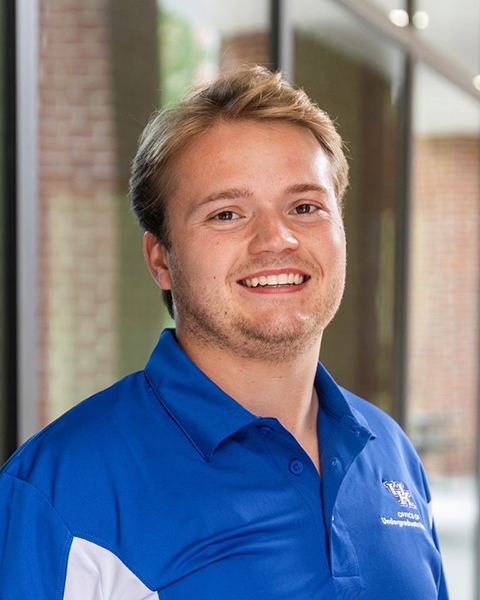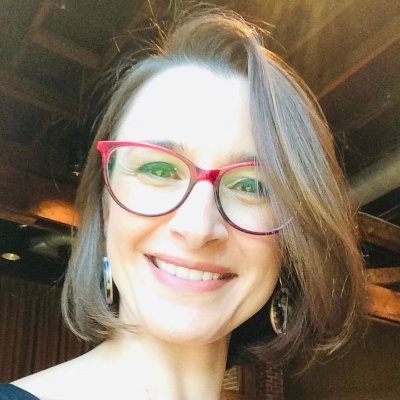Desire to share science revives a chapter
Growing up in Wayne County, Kentucky, Michael Buoncristiani witnessed firsthand the disproportionately high cancer rates and limited access to health care in his native Appalachia. But when his grandfather was diagnosed with cancer, Buoncristiani was heartened to see the advanced medical care provided at the University of Kentucky Markey Cancer Center.
“The exceptional care that my grandfather received during his illness drove my desire to pursue medicine and research as a career, particularly at the University of Kentucky,” he said. And he’s on his way. Buoncristiani just graduated from the University of Kentucky with a triple major — neuroscience, biology and agricultural and medical biotechnology — and a minor in microbiology. He recently joined the M.D. program at the UK College of Medicine.

As a freshman, Buoncristiani joined the Appalachian Career Training in Oncology program, known as ACTION, under Nathan Vanderford, an associate professor at UK. “Dr. Vanderford has been a wonderful leader,” Buoncristiani said. “He guided me into a great research group, and I got heavily involved in cancer metabolism research, initially studying Appalachian and non-Appalachian patients affected by lung cancer.”
Buoncristiani has put his passion for research and medicine into service. Since 2019, he’s been involved in community outreach activities to raise cancer awareness and divulge medically accurate information in rural Kentucky. He also served as the undergraduate research ambassador and president of outreach for the University of Kentucky Appalachian Health Initiative.
Vanderford serves as the faculty adviser for the UK’s American Society for Biochemistry and Molecular Biology Student Chapter, and from 2022 to 2023, Buoncristiani was the chapter’s president. “Much of that time was spent initiating the program and recruiting more students, getting the chapter moving again,” he said.
The chapter had been active in the past, but due to the pandemic and other factors, “it went cold,” Buoncristiani said. “The desire to attend the 2022 ASBMB annual meeting to share our scientific work was the necessary motivation to bring the chapter back to life.”
Seven students from the UK Student Chapter presented their work at the 2022 ASBMB meeting (then part of the Federation of American Societies for Experimental Biology meeting) in Philadelphia, with the help of ASBMB scholarships and travel grants secured through the chapter.
“Attending an internationally renowned scientific conference like Experimental Biology can change an undergrad student’s career trajectory,” Buoncristiani said. “There are lots of professional development opportunities and lots of premeeting nerves. It’s a big deal.
“This was the highlight of the chapter because we were able to attend our first large conference together as undergraduates,” he said. “We were all very thankful for ASBMB’s support.”
Buoncristiani has stepped away to attend medical school, but he’s confident the UK Student Chapter is in good hands. “Because of the positive experience so far, lots of students are eager to continue it,” he said. “The university is really supportive of undergrad research, so the chapter should only get bigger and stronger from now on.”
Enjoy reading ASBMB Today?
Become a member to receive the print edition four times a year and the digital edition monthly.
Learn moreGet the latest from ASBMB Today
Enter your email address, and we’ll send you a weekly email with recent articles, interviews and more.
Latest in People
People highlights or most popular articles

Sketching, scribbling and scicomm
Graduate student Ari Paiz describes how her love of science and art blend to make her an effective science communicator.

Embrace your neurodivergence and flourish in college
This guide offers practical advice on setting yourself up for success — learn how to leverage campus resources, work with professors and embrace your strengths.

Survival tools for a neurodivergent brain in academia
Working in academia is hard, and being neurodivergent makes it harder. Here are a few tools that may help, from a Ph.D. student with ADHD.

Quieting the static: Building inclusive STEM classrooms
Christin Monroe, an assistant professor of chemistry at Landmark College, offers practical tips to help educators make their classrooms more accessible to neurodivergent scientists.

Hidden strengths of an autistic scientist
Navigating the world of scientific research as an autistic scientist comes with unique challenges —microaggressions, communication hurdles and the constant pressure to conform to social norms, postbaccalaureate student Taylor Stolberg writes.

Richard Silverman to speak at ASBMB 2025
Richard Silverman and Melissa Moore are the featured speakers at the ASBMB annual meeting to be held April 12-15 in Chicago.

